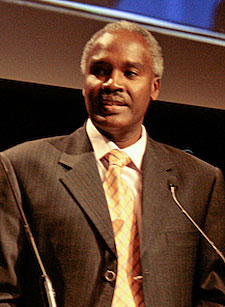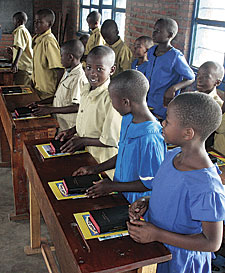You are overseas in safety when news breaks that mass murders are being carried out in your country. Would you take your family back?
 Rwandan politician Dr Charles Murigande faced this dilemma in 1994, when the shooting down of the Hutu Rwandan president's plane triggered a genocide that saw over 800,000 Tutsis and moderate Hutus killed in 100 days.
Rwandan politician Dr Charles Murigande faced this dilemma in 1994, when the shooting down of the Hutu Rwandan president's plane triggered a genocide that saw over 800,000 Tutsis and moderate Hutus killed in 100 days.
Dr Murigande (pictured) has reflected on his experience of these terrible days during his visit to Sydney this week, in which he has met with officials from the Rudd Government and endorsed Hands for Hope, an Australian project run by the Bible Society and African Enterprise in Rwandan schools.
He recalls that his decision to leave his studies at Howard University in Washington DC and take his family home shortly after the genocide "wasn't easy", especially as the Interahamwe Hutu militia had been targeting "educated people'.
"Imagine three September 11th type attacks every day for 100 days " that's what happened in Rwanda and the world did not react," he says.
Yet he says his conscience would not allow him to stay in the safety of the US, and so when his wife returned to try to help orphaned children, and the Rwandan Patriotic Front later called for Rwandans living abroad to return and help rebuild the country, Dr Murigande made the decision to go back with his children.
On his return, he found a "desolate land", with no water, power or communications.
"We would sleep in houses that had no windows, no doors, it was a big change from where we'd come from," he says.
"You would go in the house and find bodies, so you would start by taking these dead bodies out of the house, cleaning the house in order for you to stay in that house. It was a trial and a big test," he says.
On his return, Dr Murigande, a committed Christian, took up government positions left vacant as a result of the genocide. Over the years, he has served as Rwanda’s foreign minister, and minister for transport and communication.
"I hope I have made a modest contribution to the global effort of rebuilding my country,” he says.
The ache that won’t go away
While Rwandans generally live at peace with each other today, a deep personal emotional trauma remains for those who lost family members in those tragic months, Dr Murigande says.
This trauma is being fed down to children who were not born at the time of the genocide, but who are affected indirectly as they hear their parents' stories.
"Unavoidably, their parents tell their children about what has happened and sometimes" they might tell the story in a manner that builds hatred and anger, so the children are somehow affected by what happened, even if it happened before they were born," Dr Murigande explains.
 For this reason, the Rwandan Government has called on the Bible Society of NSW and African Enterprise to reach every child in Rwandan primary schools with their Hands for Hope program, in a bid to address these emotional scars.
For this reason, the Rwandan Government has called on the Bible Society of NSW and African Enterprise to reach every child in Rwandan primary schools with their Hands for Hope program, in a bid to address these emotional scars.
At least 50,000 children in 70 schools have completed the program, a reading project that uses Bible stories such as that of Joseph and his brothers to improve reading, writing and comprehension abilities, and explore themes of forgiveness, justice and reconciliation.
The long-term goal is for more than 2.2 million children in Rwandan primary schools to complete the program in the next three years.
Dr Murigande, minister for cabinet in the office of the Rwandan prime minister, is one of several Rwandan politicians who say they have seen "great changes" taking place in children's lives as a result of the program.
"In matters that are psychological and behavioural, it's not always easy to come up with a reliable measurement, but you can tell by the fact that their parents are going to the schools and asking the schools to involve them in the programs their children are involved in," Dr Murigande says.
"When they go home the children exhibit a different, probably positive, behaviour to the extent that the parents want to be affected the way they are seeing their children being affected."
Dr Murigande was keynote speaker for a Hands for Hope fundraising dinner held last Saturday night at the Westin Hotel Sydney, which was compered by TV presenter Anna Coren and also featured musician Deni Hines.


























